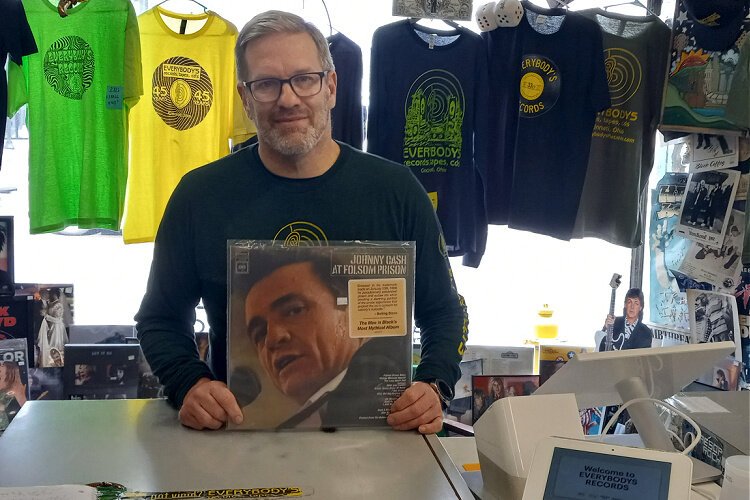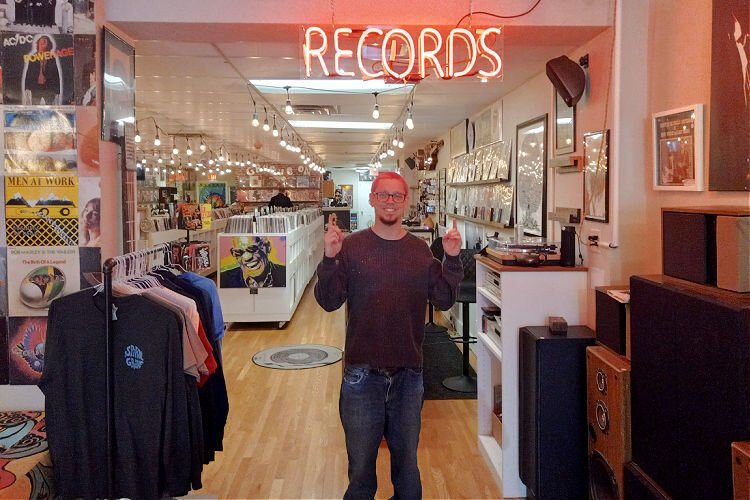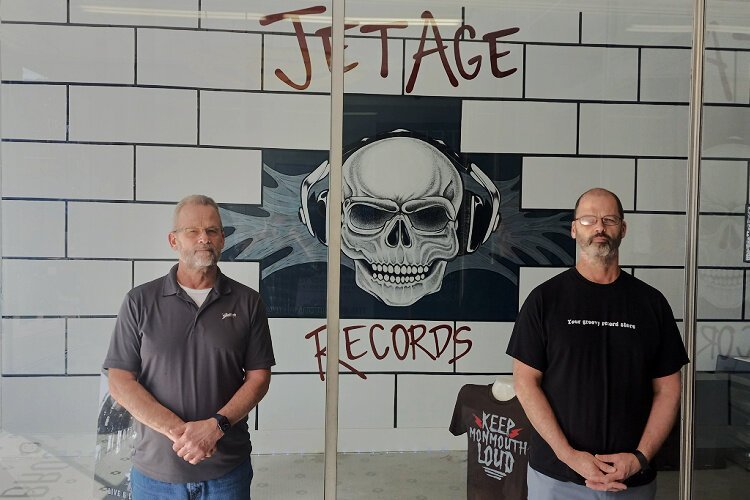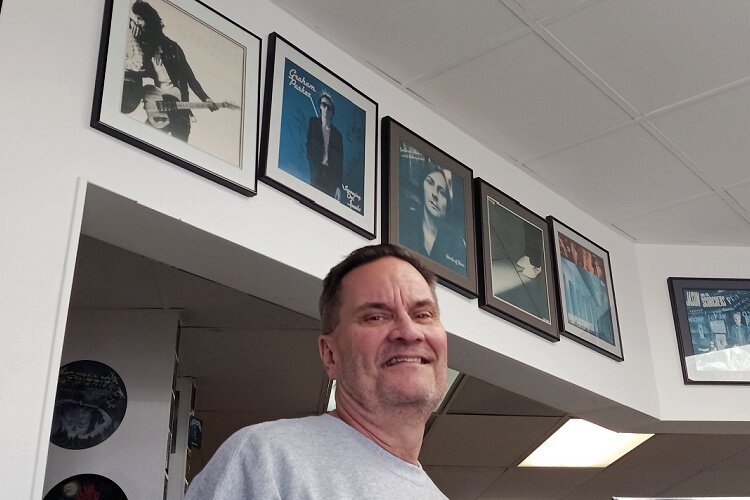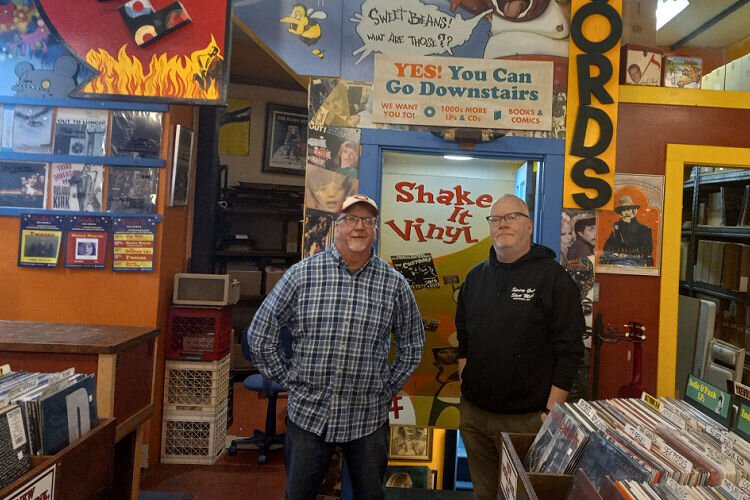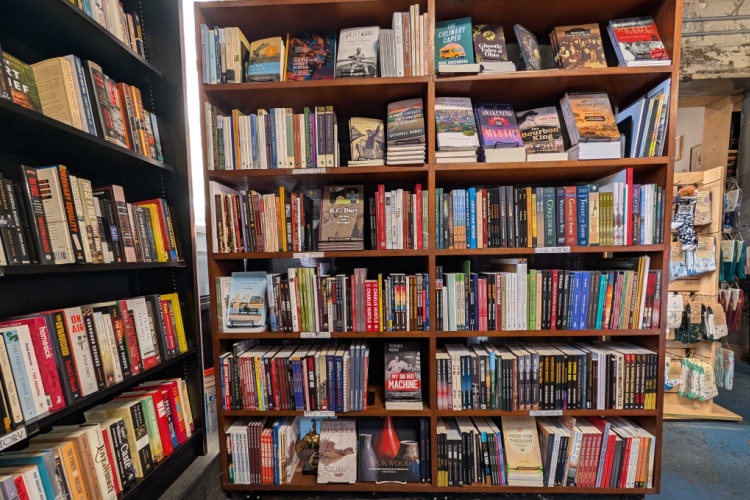At the dawn of this millennium, retail pundits were prepared to write an obituary for the neighborhood record shop. As Napster gave way to iTunes, Sirius, Pandora and Spotify, it seemed inevitable that easily accessible digital music would eliminate the desire for tangible recordings. The prognosticators were correct about the decline of CD sales, which have declined more than 90% since their 2000 apex, from approximately 900 million to less than 50 million in 2021.
However, they failed to account for the back-to-the-future resurgence of vinyl-album purchases. Baby Boomers enjoying Joni Mitchell (a personal rule: when Joni’s voice is heard, all activity stops) on vinyl might be bemused at Gen Z’s fervent passion for shellacs. But, in an age where so much of our lives is subject to portable electronics, it’s understandable to find refuge in music that we can tangibly connect. Besides, vinyl albums rich sound can’t be digitally replicated.
Vinyl’s rebirth dovetails nicely with the growing popularity of Record Store Day. Launched in 2007 to stoke store traffic in independent record shops, Record Store Day occurs every third Saturday in April and provides an opportunity for shops to provide live music and promotional events. Nearly 400 special-release albums will drop on Record Store Day LPs from varied artists such as Kate Bush, Wiz Khalifa, and Mark Knopfler helping further stoke audiophiles’ interest. 17 stores were listed last year, but four have since shuttered. Here’s a look at five area record stores that take part in Record Store Day, and how they navigate an increasingly competitive market.
When so much separates us, we can unite in a love for music. Think of the 1994 film Empire Records, about an independent record store struggling to stay afloat. In the dialogue-free segment, it shows workers and customers exalting in their music of choice. Even the postal worker delivering the mail sways to the music. This is the power of music.
Everybody’s Records
Founded in 1978 in Pleasant Ridge by Marilyn Kirby (Kirby passed in March 2022) and the shop has remained a destination for local music fans. Manager Woody Dorsey, who worked next door at Gaslight Café before Marilyn hired him 30 years ago and he made musicology his career. It wasn’t a stretch; ever since he was transfixed at 10 years old watching Johnny Cash perform on TV, music has been a passion. The first album he purchased at age 13 was AC/DC’s Back in Black, which he picked up at Woolworth’s.
Woolworth’s was long ago relegated to the retail graveyard, but Everybody’s bricks-and-mortar and online competitors are myriad. Record Store Day surpasses the holiday season as a store sales boon. The lion’s share of store sales is derived from rock, alternative and hip-hop recordings, but all genres unite in support of Record Store Day. In addition to giveaways of store gift cards, turntables, and other goodies, an eclectic mix of bands will perform. Dorsey said that he’s most excited about the day’s special releases from Southern rock/ blues legends The North Mississippi All-Stars and veteran rock/soul hybrid G Love and Special Sauce.
Billboard and other music-industry observers track sales of new recordings to track an artists’ success, but used recordings are the unsung lifeblood of independent record stores. Dorsey estimates that approximately 40% of its sales derive from previously owned recordings, which is particularly compelling given a sticker price usually well under 50% of a new counterpart. Walk-in customers selling a handful of old CDs and records are essential sources, but so are other stores shedding inventory and collectors offloading a large stash, for whom transactions for thousands of records aren’t uncommon.
It’s fitting that, as a tape reel, record or CD spins, industry trends tend to also be cyclical. Although many obituaries have been written for CDs for more than a decade, Dorsey said their sales have risen over the last couple of years. In addition to their stagnant or slightly declining prices compared to vinyl, for younger Gen Xers and millennials, CDs might confer nostalgia the way vinyl does for older generations.
Regarding the future, Dorsey said record stores typically emphasize living for today and enjoying relationships with customers, musicians, and distributors.
“It would be great for Everybody’s to make it to 50, though,” he said.
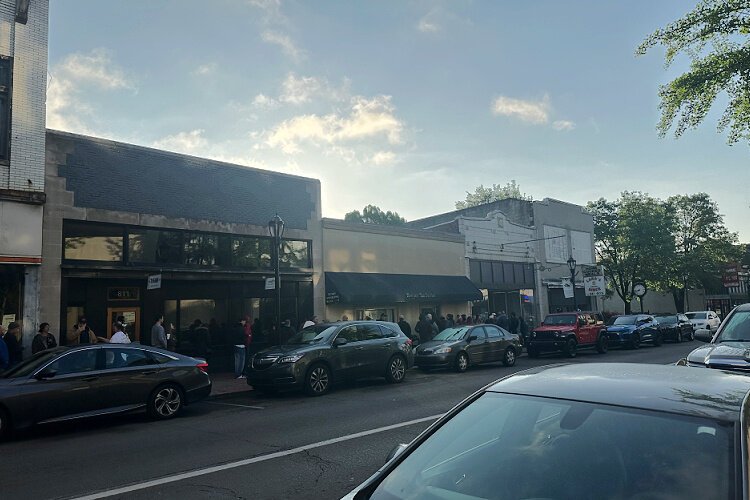
Jet Age Records
In 2017, brothers Tom, Mike, and Kevin Schraer opened Jet Age Records on Monmouth Street in downtown Newport. Tom runs the shop full-time, and Mike and Kevin assist in between day jobs.
“Our mother loved to buy K-Tel compilation records back in the ‘70s, so we were exposed to a lot of pop and rock music,” Tom said. “But I would say that Boston was the live show that stoked my passion about music.”
“For me, it was the Stones,” quipped Kevin.
Tom marveled that, when society increasingly fragmented by age, gender, socioeconomic level and other dividing lines, surging interest in vinyl records has created universal appeal among all groups.
Jet Age has been involved in Record Store Day every year except for COVID-complicated 2020 and 2021. The recently remodeled and expanded shop has featured an eclectic gamut of Record Store Day performers, which has included thrash metal, blues, and rock bands. This year, Southern jam band Electric Indigo will perform in-house.
Tom noted that Record Store Day provides a spring spike that complements the holiday season. The hundreds of special-release recordings tickle a diverse array of auditory palates, but Kevin noted that classic-rock bands such as The Grateful Dead and The Who push the needles, and that jazz sells surprisingly well.
Tom noted that territorialism is a unique trait among record shops. Whereas most retailers would feel little compunction about setting up shop near competitors explicitly to drive them out of business, he said fellow record-shop proprietors seem to leave competitors their own neighborhood fiefdoms.
Still, the Schraer brothers haven’t been complacent about growing their business. They’ve installed a full coffee bar at the back of the store and have expanded into their basement to include an expanded repertoire of used records, CDs, and cassettes. There is still a market for them, and Jet Age has even fulfilled some 8-track special orders.
The store has hosted artists who have performed at Newport’s Southgate House Revival and Megacorp Pavilion. Members of Chicago stop in when they’re performing in town, and Oscar winner Tim Robbins and former Smashing Pumpkins front man Billy Corgan have visited. In 2021, one current superstar escaped nearly incognito.
“This small, dark-haired young guy asked where our Bob Dylan records were, and spent a long time in that section,” Tom said. “He was quiet, polite, and thanked us. As he walked out the door, the women behind him in line, wide-eyed, exclaimed, “That’s Timothee Chalamet!”
The Dune star was in the area filming the movie Bones and All and will star in the Dylan biopic A Complete Unknown, which reportedly began production last month. Tom quipped, “Maybe we’ll get a check for providing him some research material.”
Phil’s Records
After learning the trade as an employee at Record Alley, a former Northern Kentucky independent record store, Phil Breen ventured out on his own and founded Phil’s Records on Ft. Thomas Plaza on Alexandria Pike in 1989. Phil’s encyclopedic knowledge of all music genres quickly earned legions of devoted customers from both sides of the Ohio, and eventually his business expanded to six Kentucky and Ohio stores, some of which were large enough to offer live music.
However, as usage of online and streaming formats grew attrition gradually occurred, and Breen streamlined his business to a small, unassuming location in Latonia. “It’s hard to compete with free,” he quipped. Operating a record store may seem like a languid, uncomplicated business, but he acknowledged there’s far more to the gig than appearances might suggest.
“On the morning before a major new release, it takes a lot of work to get the store ready,” he said. “And, you have to be very careful with ordering. We have limited funds and space that we can’t afford to waste on inventory that doesn’t sell. People think it’s a carefree life of just talking about music all day. But it takes a lot of work and dedication.”
That’s why Breen takes a somewhat more reserved approach to marketing Record Store Day. There’s some uptick in demand that day but lacking immediate proximity to a college campus or a younger population, throngs won’t be awaiting his shop’s unlocked doors that morning.
There’s something of a stereotype of record-store owners as almost pathological music snobs with no patience for the average listener’s taste. That’s not Phil. “Music has almost universal appeal,” he said. “People’s tastes are their tastes. I’m not judging anyone. I read and research as much as I can to know about the recording industry and try to help customers find recordings they’ll enjoy.”
A record store owner’s expertise in satisfying people’s auditory enjoyment equates to a hotel concierge helping guests locate a restaurant they’ll enjoy. No search engine or app can replicate that knowledgeability or authenticity.
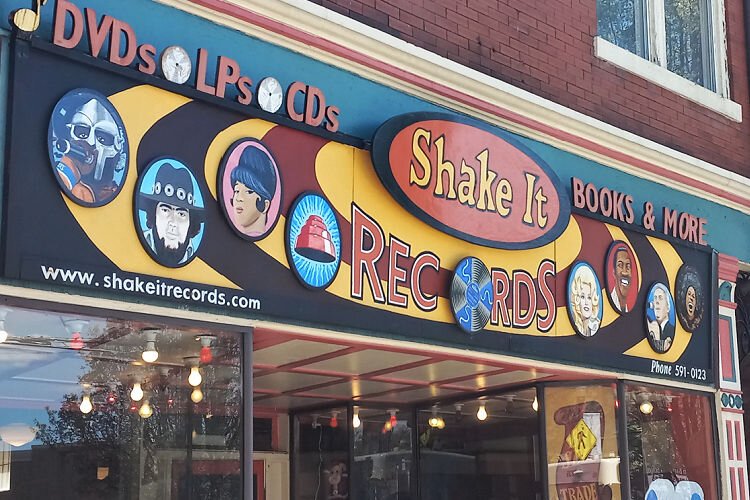
Shake-It Records
When brothers Darren and Jim Blasé opened Shake-It records on Hamilton Ave. in Northside in 1999, comments were at times less than supportive.
“One person said, ‘Well, you must be a trust-fund kid,” and another said, ‘You’re an idiot.”
During the heyday of Napster, and the increasingly accessible universe of online-accessible music, coupled with the then-powerful grasp of music-store chains like Sam Goody, Camelot Music, and others, it may have seemed a kamikaze approach to an entrepreneurial venture.
A quarter-century later, even amid digital music’s evolution to streaming services, the store has weathered many industry-specific and macroeconomic tempests and remains a haven for music buffs across all genres. One reason Darren thinks conscientious fans continue to favor indie stores and tangible recordings is the burgeoning “shop local” ethos and, with the exception of a few household-name performers, musicians earn significantly more from LPs and CDs than they do from downloads.
Darren noted that his sales split roughly evenly divided between vinyl and CDs, with a smattering of customers opting for cassettes (Note: This writer finds that amusing, given the number of such recordings lost due to tape eaten by a ravenous player).
Shake-It stands a charter member of Record Store Day; it was one of the shops that initially invested in the venture. It’s evolved to being of equal importance to Black Friday as a profit booster. Many of Shake-It’s Record Store Day promotions have revolved around local band offerings that record under Shake-It’s in-house recording label, such as Jeremy Pinell, Maura Weaver, and Wussy.
“We have customers camping out early in the morning to shop,” Darren said. “We delay having live performers until late afternoon or early evening to let the initial surge subside. Otherwise, it would be sheer chaos.”
Darren noted that the average price for a new vinyl record in 1983 was about $8.99, which adjusted for inflation, equates to about $22. Record hounds know that is significantly below today’s going rate – in 2022, it was $29.65, according to Billboard, and has undoubtedly risen since. Growing demand undoubtedly plays a role; 2023 sales grew 14% to 49.6 million units – also 10-fold growth from 2013 — in the U.S. according to Statista. The costs of raw components used to produce vinyl records have risen, and the number of production facilities hasn’t grown in step to demand.
However, to paraphrase the saying, you buy from emotion and then justify with reasons. Passion is certainly a driving force. As any veteran collector can tell you, purchasing recorded music isn’t about a transaction; it’s about the entire experience.
“Dave Cunningham [owner of Northside restaurant/bar The Comet] once said, ‘I don’t sell beer, I sell a social event’,” Darren said. “I think that same principle applies to us. There are lots of sources to access music. Taking in the whole atmosphere of a record store, access to tens of thousands of records from all corners of the globe and sharing space with people others equally passionate about music, that’s what we offer.”
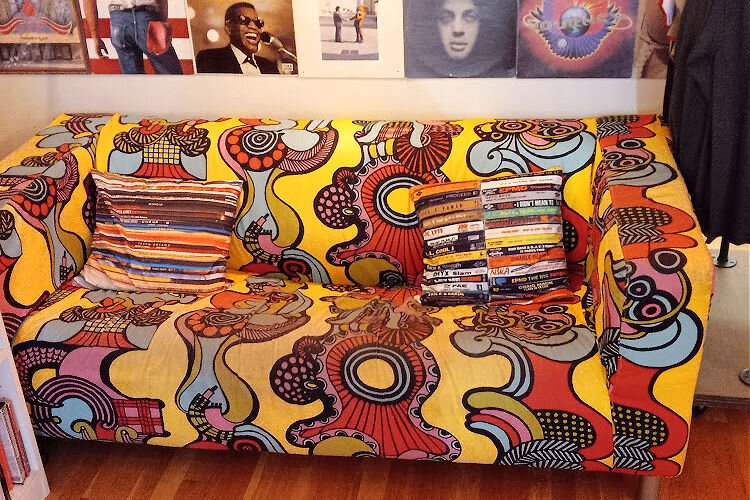
Spiral Groove Records
Main Street in Old Milford has a placid, throwback quality. There are antique stores and myriad small businesses that would have seemed at home on the set of The Andy Griffith Show.
And then there’s Spiral Groove, a record shop in the middle of the historic district’s Main Street. The smell of incense as one opens the door and the psychedelically colorful coach facing the entrance provide a takeaway from a very different 1960s ethos, but the rest of the shop provides an immersion of all the eras and aesthetics entailed within 60-plus years of rock, hip-hop, country, and more. A post-punk band called The Bouncing Souls, who are reminiscent of Green Day, blare on the store’s sound system, and Halloween 3: Season of the Witch, textbook ‘80s horror-film camp, plays on its monitors. Many pop-culture boxes were checked.
Owner Adam Mitzel, who worked at the previous location before moving Spiral Groove to its current digs in 2021, grew up in nearby Terrace Park, and was a fan of punk rock and attending countless concerts and raves. Proto-punk icons The Misfits have been a nearly lifelong favorite, and they’re well represented on store walls. However, the store’s expansive inventory appeals to all.
“Pop and Hip-hop are probably the biggest genres we sell collectively, but [Kentucky native and Americana superstar] Tyler Childers is our biggest-selling individual artist.” Adam said.
For Record Store Day, Spiral Groove will host DJ Sergio, who will spin dance-oriented tunes in-store. He said that approximately 70% of his sales come from vinyl records, and he said that he is always looking for “a dose of different” to broaden his customers’ musical horizons. “I enjoy finding world music, especially Cuban and Brazilian music, which are fun and infectious.”
One signature Spiral Groove offering its heat-formed bowls made from vinyl records. Adam credits his ex-wife with hatching the idea, and now all of his employees make their own at home. “They’re unique, and it’s not a very difficult process,” he said. “You just have to watch it carefully, and not turn the heat up very high.” The shop’s ample basement provides an opportunity for future growth. Currently, it’s mostly storage, but Adam plans to open a live-music space there in the coming years. Could that include a club with a full bar? “Well, we’ll see, that requires jumping through a lot of hoops,” Adam said.
Regional Record Store Day participating shops
Here’s an updated list (as of April 5) of shops within 50 miles of downtown Cincinnati participating in Record Store Day:
- Everybody’s Records, 6106 Montgomery Rd, Pleasant Ridge, 513-531-4500 https://everybodysrecords.com/
- Hail Records & Oddities, 720 Main St., Covington 859-261-0107 https://www.hailcincinnati.com/
- Hey Suburbia Records, 108 W. Main St., Mason, 513-492-9864 www.heysuburbiarecords.com
- Jet Age Records, 817 Monmouth St., Newport, 859-916-5466 www.jetagerecords.com
- Lester’s Rock and Roll Shop, 1959 Central Ave., Middletown, 513-997-9621 www.lestersrocknrollshop.com
- The Media Rack, 5729 Glenway Ave., Cincinnati, 513-834-5573
- Morrow Records, 6608 Dixie Hwy., Florence, 859-918-1236 www.morrowrecords.com
- Phil’s Records, 3914 Winston Ave. Latonia, 859-441-2514
- Paper Street Trading Company, 4409 Montgomery Rd., Norwood, 513-918-3912
- Plaid Room Records, 122 W. Loveland Ave., Loveland, 513-583-1843 www.plaidroomrecords.com
- Shake-It Records, 4156 Hamilton Ave., Northside, 513-591-0123 www.shakeitrecords.com
- Spiral Groove, 215B Main St., Milford, 513-600-0818 www.spiralgrooverecords.com
- Three Feather Records, 1105 Magie Ave., Fairfield, 513-816-7361 www.threefeatherrecords.com
For more information about Record Store Day, visit www.recordstoreday.com.

